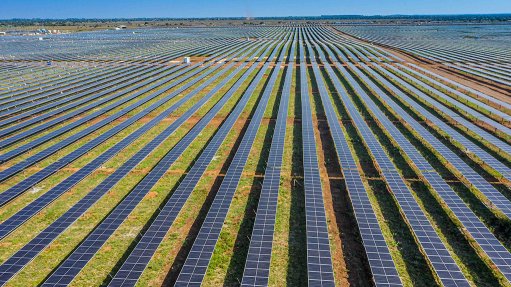Public-Private Partnerships could rescue power supply
This article has been supplied as a media statement and is not written by Creamer Media. It may be available only for a limited time on this website.
Strong partnerships between the public and private sector will be required to create a reliable supply of electricity in South Africa and reverse the impacts of loadshedding, according to global experts.
Municipalities do not have the skills or resources to tackle the challenges of installing renewable energy on their own - while private enterprise, which has both, is being hampered by policy issues and regulations, say renewable energy consultants.
The role of partnerships to deliver a reliable electricity supply, maintain livelihoods and sustain economic growth came under the spotlight at the “Synergy for Energy” seminar hosted by the Vuthela iLembe LED Support Programme. The Vuthela programme is funded by the Swiss State Secretariat for Economic Affairs (SECO) and implemented in partnership with the KZN Department of Economic Affairs and Tourism, and three municipalities to create an enabling environment for inclusive economic growth in the rapidly developing iLembe district on the North Coast which includes the towns of Ballito, KwaDukuza and Mandeni as well as the rural hinterland.
Private and public sector delegates discussed the challenges and opportunities related to securing a reliable and secure electricity supply through implementing efficiency measures and using renewable energy sources.
The seminar was held against the backdrop of the loadshedding crisis which continues to hamper economic activity and growth, with many municipalities throughout South Africa racing to develop renewable energy solutions to supplement the shortage of power on the Eskom grid. About 40 municipalities have already developed tariffs for small scale embedded generation SSEG) into their grids, but most are lagging behind the process, it emerged from presentations at the seminar.
Andres Detomasi, a World Bank advisor on renewable energy to many South African municipalities, told the seminar that the lack of access to electricity and an unreliable supply was the fifth biggest obstacle faced by private companies globally, according to the World Bank Enterprise Survey 2018.
“The basic expectation from an electricity distributor is the provision of a continuous supply,” said Detomasi.
The World Bank is supporting many municipalities in South Africa to improve the reliability of the electricity supply with specialised technical support.
Richard Ahlschlager, Technical Director at Zutari, a private company that provides infrastructure solutions in 35 countries in Africa and the Middle East, outlined the challenges and opportunities in implementing renewable energy solutions.
The lack of clear rules and guidelines in enabling policy and inappropriate tariffs for wheeling (selling solar-generated power into the Eskom grid) topped the list of barriers. Additional factors included the lack of technical capabilities and a lack of sufficient knowledge about the limitations of solar energy.
The high cost of installing solar power, coupled with the fact that many municipalities viewed renewable energy as a threat to their revenue base, were also significant barriers.
However, many opportunities are emerging in the embedded generation space.
No licence is required for embedded generation below the 100 MW limit, although facilities must be registered. Precincts and sectional title facilities can have consolidated and amalgamated supplies to save costs.
Reducing reliance on the Eskom electricity grid using cost-effective solutions and appropriate tariffs also offered benefits.
Consolidated energy storage facilities and tri-generation (which combines heat, power and cooling solutions through integrated systems) could also be considered to create efficiencies and improve reliability.
Zutari believed that collaboration between partners in the private and public sector was essential to resolve issues and bring real benefits.
Collaboration could be strengthened by creating platforms for engagement, holding regular and structured engagements and using private sector resources to assist government where possible. It was essential to create a conducive enabling environment, bring in expertise where needed, and improve the security of supply through embedded generation.
Josh Dippenaar, an engineer at the Embedded Generation Support Programme, said the programme provides municipalities, residents, business owners and other stakeholders with guidance about municipal SSEG regulations, tariffs and application processes.
About 100 municipalities in South Africa have joined the programme as partners, and 40 have already devised feed-in tariffs, enabling them to implement SSEG programmes.
This indicates the immense potential of partnerships and collaboration to secure a more reliable supply of power in municipalities, reduce the impact of loadshedding and produce energy more efficiently.
Comments
Press Office
Announcements
What's On
Subscribe to improve your user experience...
Option 1 (equivalent of R125 a month):
Receive a weekly copy of Creamer Media's Engineering News & Mining Weekly magazine
(print copy for those in South Africa and e-magazine for those outside of South Africa)
Receive daily email newsletters
Access to full search results
Access archive of magazine back copies
Access to Projects in Progress
Access to ONE Research Report of your choice in PDF format
Option 2 (equivalent of R375 a month):
All benefits from Option 1
PLUS
Access to Creamer Media's Research Channel Africa for ALL Research Reports, in PDF format, on various industrial and mining sectors
including Electricity; Water; Energy Transition; Hydrogen; Roads, Rail and Ports; Coal; Gold; Platinum; Battery Metals; etc.
Already a subscriber?
Forgotten your password?
Receive weekly copy of Creamer Media's Engineering News & Mining Weekly magazine (print copy for those in South Africa and e-magazine for those outside of South Africa)
➕
Recieve daily email newsletters
➕
Access to full search results
➕
Access archive of magazine back copies
➕
Access to Projects in Progress
➕
Access to ONE Research Report of your choice in PDF format
RESEARCH CHANNEL AFRICA
R4500 (equivalent of R375 a month)
SUBSCRIBEAll benefits from Option 1
➕
Access to Creamer Media's Research Channel Africa for ALL Research Reports on various industrial and mining sectors, in PDF format, including on:
Electricity
➕
Water
➕
Energy Transition
➕
Hydrogen
➕
Roads, Rail and Ports
➕
Coal
➕
Gold
➕
Platinum
➕
Battery Metals
➕
etc.
Receive all benefits from Option 1 or Option 2 delivered to numerous people at your company
➕
Multiple User names and Passwords for simultaneous log-ins
➕
Intranet integration access to all in your organisation


















